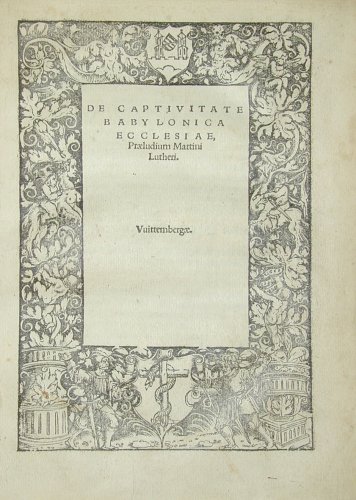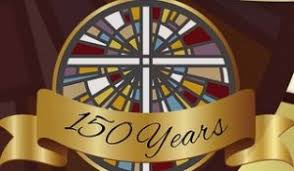The Royal Priesthood of Believers
The Babylonian Captivity of the Church by Martin Luther
This book was published in October, 1520. This was after Pope Leo wrote his papal bull about Martin Luther, but before Luther received it. Luther studied the Bible carefully, and talked about many things in this book. One of his most important ideas was about church hierarchy. The church taught that priests were given special powers by God. There were priests and monks, and bishops, cardinals, and the Pope and each layer of the hierarchy was supposedly more important and godly than the one below it.
Luther searched the Bible and could not find anything that said that God wanted a special group to stand between God and ordinary people. The priests told people they could forgive sins (like the "tickets to heaven" sold by Tetzel), knew if people were good or bad, and could tell them what God wanted them to do.
Luther decided the exact opposite was true. Luther said that faith was a matter of heart and soul, and only God Himself could know if a person truly had faith and had accepted fully the salvation offered by His Son, Jesus Christ. The relationship between God and His people was direct, and everyone with true faith in God was part of His priesthood, no more or less important in God's eyes than any other person of faith, including priests, bishops, cardinals, and even the Pope himself!
According to Luther, ministry should be about teaching and sharing the Word of God. He believed that all people of true faith were priests with the power and responsibility to share the Word of God with others by their deeds even more than their words.
This did not mean that there shouldn't be churches or ministers. People need a way to gather together to celebrate their salvation through Christ and faith in God, and to invite the Holy Spirit into their midst. Communities of Christ need to organize and have leaders and teachers to help people learn about the gifts they receive from God. However, Luther believed that these leaders and teachers should be part of the communities and not separate or above them. Luther believed that the church in his time used its theology and practice to make sure that ordinary people felt powerless. He thought the Pope and other church officials used their positions to gain wealth and power. Luther felt that twisting the meaning of the Bible and tricking people of true faith was the biggest sin of all. Luther dared to criticize the church, the Pope, and their motives, and his ideas started a religious revolution!
 A sacrament is a special ritual that Jesus started that connects those who participate in it with God and offers a sacred way to experience God's grace. In the Lutheran Church, we believe that there are only two, baptism and communion, and that these sacraments do not exclude any Christian from participation and a direct connection with God.
A sacrament is a special ritual that Jesus started that connects those who participate in it with God and offers a sacred way to experience God's grace. In the Lutheran Church, we believe that there are only two, baptism and communion, and that these sacraments do not exclude any Christian from participation and a direct connection with God.
Then and now, the Catholic Church recognizes seven sacraments. In Luther's day, the local priest was often the most important and respected person in a community. Part of that importance was because people believed that the priest was closer to God. That closer connection was created during the sacrament of ordination. Although he didn't know it at the time, when Luther said ordination wasn't a sacrament and didn't make the priests "special," Luther was challenging not only the church hierarchy, but also the way regular communities worked.
From "The Babylonian Captivity of the Church"
Ordination
Ordination was the ceremony performed when those studying for the priesthood took their vows and officially became priests. In the Catholic Church, this ceremony was considered a sacrament that bestowed special powers and privileges on the new priests. In The Babylonian Captivity of the Church, Luther argued that ordination was not a sacrament and that God did not act through the ceremony to give priests special status.
There is not the least mention of [ordination] in the whole New Testament...If [the church heirarchy] were forced to grant that, as many of us as have been baptised, are all priests without distinction...they have no right to rule over us except in so far as we freely concede it. For thus it is written in 1 Peter 2:9, "Ye are a chosen generation, a royal priesthood, and a priestly kingdom." Therefore we are all priests, as many of us as are Christians. And the priesthood is nothing but a ministry, as we learn from 1 Corinthians 4:1, "Let a man so account of us as of the ministers of Christ, and the dispensers of the mysteries of God." ... Let every one, therefore, who knows himself to be a Christian be assured of this, and apply it to himself, — that we are all priests, and there is no difference between us. They have sought to set up a nursery of implacable discord, whereby clerics and laymen should be separated from each other farther than heaven from earth, to the incredible injury of the grace of baptism and the confusion of our fellowship in the Gospel. Here, indeed, are the roots of that detestable tyranny of the clergy over the laity; trusting in the external anointing by which their hands are consecrated, they not only exalt themselves above lay Christians, who are only anointed with the Holy Spirit, but regard them almost as dogs and unworthy to be included with them in the Church.
Ordination in the Lutheran Church is not a sacrament. It is a solemn and important ceremony during which the Church assures its members that the new pastor has studied and understands the Bible and the Book of Concord (another important book written by Martin Luther that explains the basis of Lutheran faith) and is well-prepared to become a teacher and leader of the church. The new pastor affirms that s/he will be faithful to the Lord and the Lutheran perspective as s/he takes a leadership role in the Lutheran community. Both the church and the new pastor call upon God to bless and assist them in fulfilling their obligations to Him. The ceremony does not imply that God in any way acts to confer elevated status on either the church or its pastors.
 1 Peter Chapter 2
1 Peter Chapter 2
1Therefore, putting aside all malice and all deceit and hypocrisy and envy and all slander,
2like newborn babies, long for the pure milk of the word, so that by it you may grow in respect to salvation,
3if you have tasted the kindness of the Lord.
4And coming to Him as to a living stone which has been rejected by men, but is choice and precious in the sight of God,
5you also, as living stones, are being built up as a spiritual house for a holy priesthood, to offer up spiritual sacrifices acceptable to God through Jesus Christ.
9But you are a chosen race, a royal priesthood, a holy nation , a people for God's own possession, so that you may proclaim the excellencies of Him who has called you out of darkness into His marvelous light;
15For such is the will of God that by doing right you may silence the ignorance of foolish men.
16Act as free men, and do not use your freedom as a covering for evil, but use it as bondslaves of God.
17Honor all people, love the brotherhood, fear God, honor the king.
1 Corinthians Chapter 4
1Let a man regard us in this manner, as servants of Christ and stewards of the mysteries of God.
5Therefore do not go on passing judgment before the time, but wait until the Lord comes who will both bring to light the things hidden in the darkness and disclose the motives of men's hearts; and then each man's praise will come to him from God.
7For who regards you as superior? What do you have that you did not receive? And if you did receive it, why do you boast as if you had not received it?
15For if you were to have countless tutors in Christ, yet you would not have many fathers.






